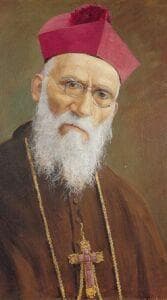
Blessed Andrea Giacinto Longhin
Blessed
Feast Day: June 26
Birth: November 22, 1863
Death: June 1, 26
Biography
Blessed Andrea Giacinto Longhin, also known as Andrew of Fiumicello, Andrew Longhin, Andrew of Campodarsego, and Bishop of the Catechism, was born on 22 November 1863 in Fiumicello di Campodarsego, in the province and diocese of Padua, Italy. He was the only son of Matthew and Judith Marin, who were poor but devout tenant farmers. From a young age, he felt a calling to the priesthood.
Despite his father's objections, Andrea entered the Capuchin novitiate and took the name Andrew of Campodarsego on 27 August 1879, when he was just 16 years old. He studied at the seminaries in Padua and Venice, making his solemn profession on 4 October 1883 and receiving ordination on 19 June 1886.
For 18 years, Blessed Andrew served as a spiritual director for young religious. He taught at the Capuchin seminary in Udine, Italy, and later became the director of Capuchin teachers in Padua in 1889. In 1891, he became the director of theology students in Venice. It was during this time that he caught the attention of the future Pope Saint Pius X while serving as the Capuchin Provincial Minister in Venice, starting from 18 April 1902.
On 17 April 1904, Andrew Longhin was consecrated as the Bishop of Treviso, Italy, in Rome. Throughout his 32-year tenure as bishop, he dedicated himself to reforming the diocese. Facing resistance from both parishioners and clergy, he spent five years traveling from parish to parish, preaching the Gospel and building close relationships with the people he served. He focused on improving the quality of teaching and spiritual formation at the diocesan seminary, as well as promoting spiritual retreats for the clergy.
Bishop Andrew actively supported the Catholic social movement and fought for workers' rights to organize. He encouraged the presence of various religious orders in his diocese, resulting in an increase in male and female institutes. During this time, he became friends with Saint Leopold Mandic, sharing a common dedication to the Catholic faith and the well-being of the people they served.
In World War I, when Treviso was destroyed by air and ground attacks, Bishop Andrew remained steadfast at his post, providing aid and support to soldiers, the wounded, the sick, and the poor. Refusing to align himself with any of the warring parties, he was unjustly convicted of defeatism and imprisoned, along with several of his priests. After his release, he resumed his pastoral work, focusing on rebuilding the city and the 47 parishes that had been destroyed. In recognition of his exceptional service, he was eventually awarded the Cross of Merit war decoration.
During the post-war years, Bishop Andrew worked tirelessly with lay groups to maintain the Catholic identity of the social movement. Despite the growing Fascist movement, he emphasized non-violence and loyalty to the Church, often finding himself in conflict with the political ideologies of the time. In 1920, he supported the Leghe Bianche, a Christian union movement.
Pope Pius X recognized Bishop Andrew's deep commitment to unity and appointed him as the Apostolic Visitor to Padua in 1923, followed by Udine from 1927 to 1928. His presence in these dioceses aimed to bring harmony between the priests and bishops amidst disagreements.
After a long and fruitful life serving God and his people, Blessed Andrea Giacinto Longhin passed away on Friday, 26 June 1936, in Treviso, Italy, following an eight-month illness. He was buried in the cathedral of Treviso. Recognizing his exemplary virtue, Pope John Paul II declared him venerable on 21 December 1998.
Finally, on 20 October 2002, Pope John Paul II beatified Blessed Andrea Giacinto Longhin, highlighting his holiness and the sanctity of his life. The miracle attributed to his intercession involved the miraculous cure of Dino Stella from diffuse peritonitis in 1964. The Cause for his beatification had begun on 21 April 1964, marking the official recognition of his heroic virtues. Today, Blessed Andrea Giacinto Longhin is remembered as a dedicated bishop, a zealous reformer, and a compassionate shepherd of souls.